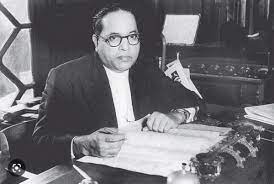Dr. Ambedkar, India’s 1st Law minister’s resignation letter missing from records

Despite an extensive inquiry and search, the document could not be located: President’s Secretariat
The resignation letter of the first Law Minister B.R. Ambedkar in India’s union government (cabinet) is missing from the official records. The President’s Secretariat has confirmed this worrying piece of information, in writing to the Central Information Commission (CIC) reported The Hindu. This despite an extensive search in the Constitutional Affairs Section, the document could not be located.
The case arises out of a petition filed under the Right to Information Act, 2005, seeking a certified copy of Dr. Ambedkar’s resignation letter which was accepted by the then President. The petitioner, who wrote to the Prime Minister’s Office (PMO), Cabinet Secretariat, and the President’s Secretariat, also sought to know the reasons recorded by the first Law Minister when he resigned from the post. It is well known that tje resignation followed the initial reluctance of the Nehru cabinet to back the Hindu Code Bill. Instead of pushing the matter farther, the CIC has simply disposed off the petition!
Following the transfer of the petition from the PMO to the Cabinet Secretariat, the latter informed that the President of India accepted the resignation of Dr. Ambedkar from the office as Minister of Law with effect from October 11, 1951. The date of acceptance of the resignation by the Prime Minister may be available in the PMO. “No other information on this point is available with this office,” the Chief Public Information Officer (CPIO), Cabinet Secretariat, said.
With no further information forthcoming from the CPIOs of the three top offices, the petitioner Prashant thereafter filed an appeal before the CIC. He argued that the resignation letter of Dr. Ambedkar ought to exist in the records of the PMO or the President’s Secretariat as these two offices were the sole authorities to accept or reject the resignation of any member of the Council of Ministers.
Referring to the reply of the Cabinet Secretariat that the President of India had accepted the resignation of Dr. Ambedkar with effect from October 11, 1951, he said the resignation copy should be available with the President’s Secretariat.
While the CPIO, Prime Minister’s Office, stated the petition was transferred to the President’s Secretariat as acceptance or rejection of resignation letters of Ministers fell within the constitutional functioning of the President of India, the CPIO, Cabinet Secretariat, said his office only provided secretarial assistance to Cabinet and Cabinet Committees and rules of business as per the Government of India (Allocation of Business) Rules, 1961. Hence no information requested in the appeal was available to the Cabinet Secretariat.
On his part, the CPIO, President’s Secretariat, Rashtrapati Bhavan, said despite an extensive search in the Constitutional Affairs Section, the document requested by the appellant could not be located and hence no information was available on record.
Passing orders in the case on February 10, Chief Information Commissioner Y.K. Sinha, said only such information that was held and available with a public authority can be provided and no direction could be issued for the creation of any record. “After examining the detailed submissions made by all the parties, it appears that the custody of the information may lie with the President’s Secretariat. However, it is a categorical submission from the President’s Secretariat that no information is held on their record. Hence, no further intervention can be made by the Commission at this stage,” Unfortunately thereafter, Mr. Sinha said while disposing off the petition.
Incidentally, former President Ram Nath Kovind, when he was Governor of Bihar in 2016, had said addressing students at a seminar that Dr. Ambedkar resigned from Jawaharlal Nehru’s Cabinet when then first post independence Nehru cabinet failed to back the reformist Hindu Code Bill.
Courtesy : Sabrang India
Note: This news piece was originally published in sabrangindia.com and used purely for non-profit/non-commercial purposes exclusively for Human Rights







